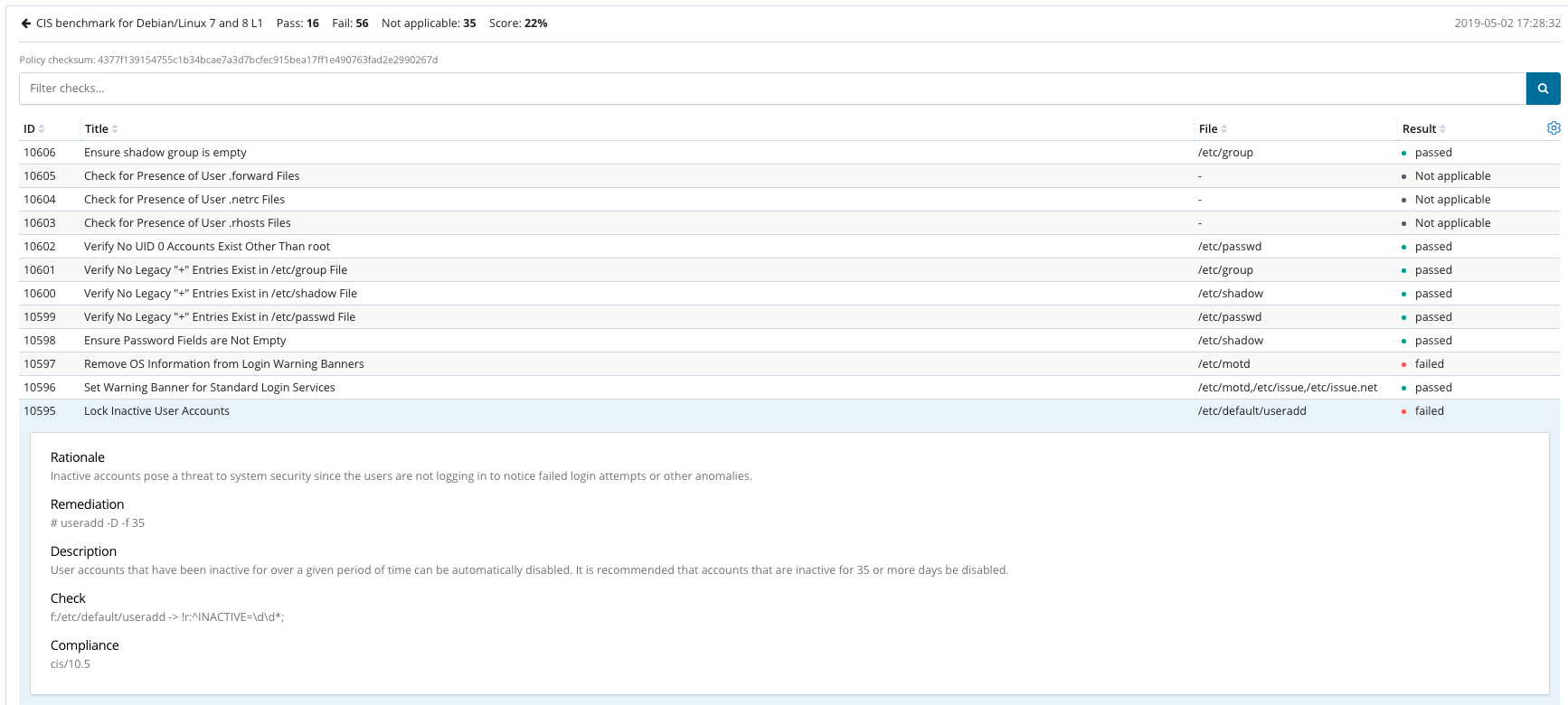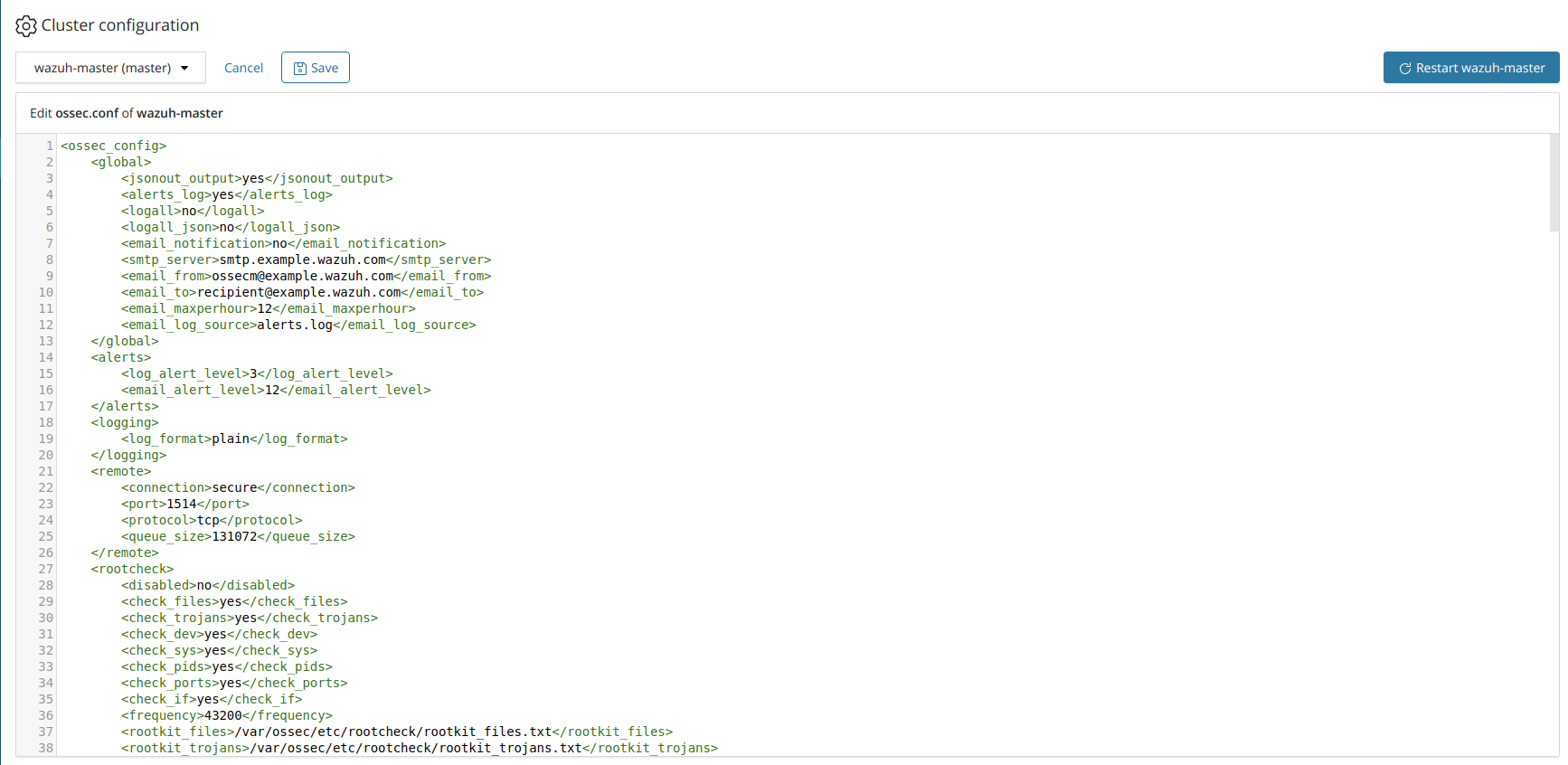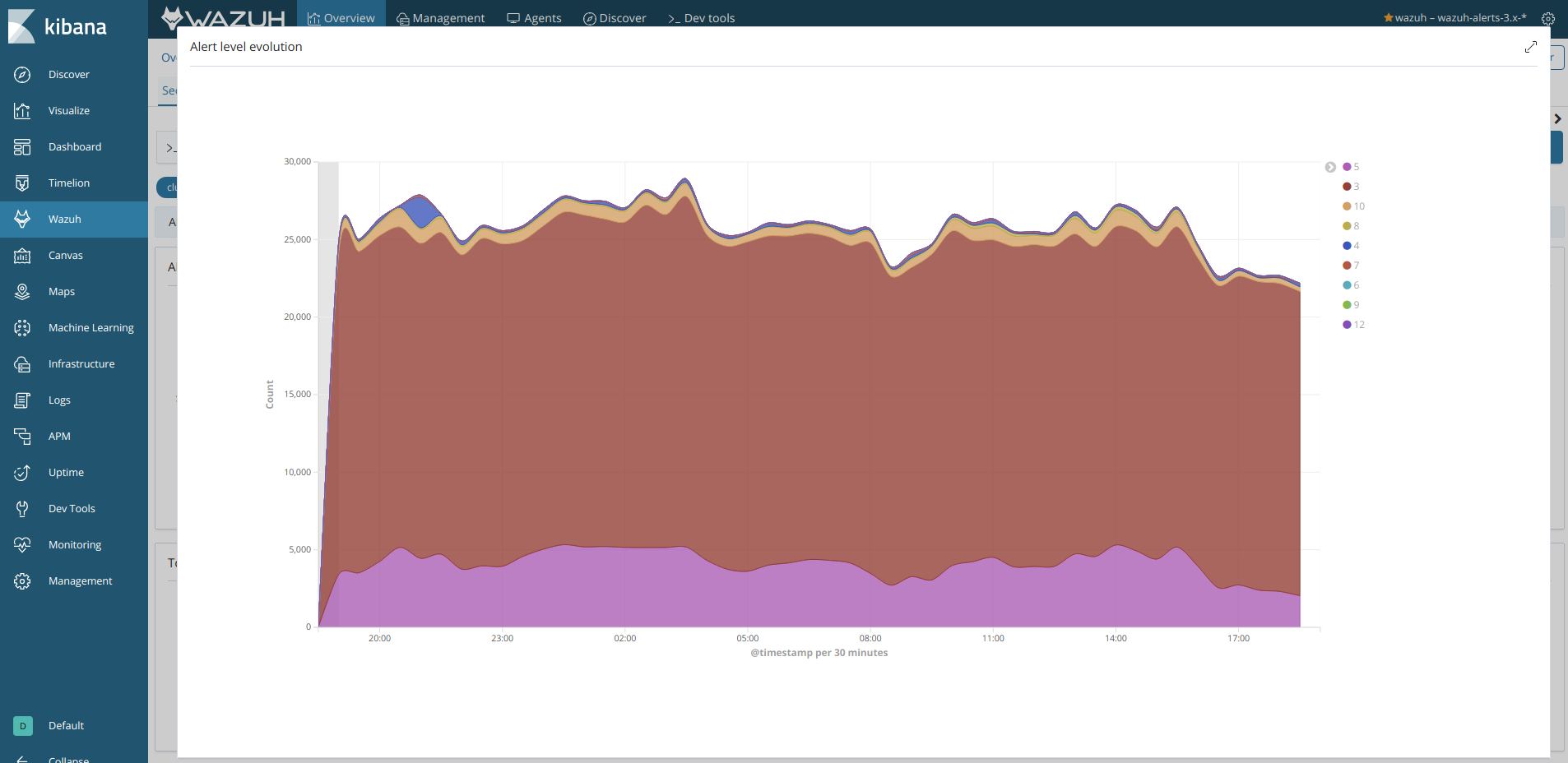3.9.0 Release notes
This section shows the most relevant improvements and fixes in version 3.9.0. More details about these changes are provided in each component changelog:
Wazuh core
Automated deployment
Agent installers support now variables which allow deploy an agent in a simple step.
Here we can see an example for CentOS/RHEL:
$ WAZUH_MANAGER_IP="10.0.0.2" yum install wazuh-agent
The above example will install, configure and register the agent, making simple the deployment process.
Security Configuration Assessment (SCA)
Security Configuration Assessment (SCA) is a new module created to improve hardening and policy monitoring capabilities in Wazuh. Policy files are now in YAML format, making easier modifications and reading. Policies have been extended, useful compliance information has been added to each policy (rationale, remediation, CSC, etc.). Scan results are sent and stored in Manager side, being accessible using both the Wazuh API and the Wazuh app.
SCA includes a new database integrity algorithm (which will be included on other modules as FIM and Inventory in the coming releases). The agent will send only those checks which status have changed from previous scans, saving network traffic and decreasing manager load.
Here is an example that runs a scan the 15th of every month:
<sca>
<enabled>yes</enabled>
<scan_day>15</scan_day>
<policies>
<policy>cis_debian_linux_rcl.yml</policy>
</policies>
</sca>

Inventory module
Get network and open ports for Windows XP and Windows Server 2003 systems.
Events information can be decoded into dynamic fields, so we can define rules based on Inventory events. Decoders now accept
syscollectoras value for<decoded_as>tags.Get the real MAC address of each interface in /sys/class/net/address instead of getting it from interfaces with AF_PACKET sockets, avoiding this way problems with bonded interfaces that share the same MAC address at software level.
FIM: Who-data
Who-data now supports a pre-start health check to make sure Audit socket is ready.
Who-data now supports symbolic links hot changes.
Added support for Fedora 29 systems that use Audit 3.0.
AWS Organizations in CloudTrail
With this enhancement, it is possible getting logs for created organizations by adding <aws_organization_id>ORGANIZATION</aws_organization_id> in the module configuration.
Here is an example of how to configure this new AWS capability:
<wodle name="aws-s3">
<disabled>no</disabled>
<bucket type="cloudtrail">
<name>cloudtrail</name>
<aws_organization_id>wazuh</aws_organization_id>
<aws_profile>default</aws_profile>
</bucket>
<remove_from_bucket>no</remove_from_bucket>
<interval>20m</interval>
<run_on_start>yes</run_on_start>
<skip_on_error>no</skip_on_error>
</wodle>
Wazuh cluster
The Wazuh manager no longer has any external dependencies on Python. The manager now includes its own embedded Python 3 interpreter. Making easier to configure integrations as AWS, VirusTotal, Azure or Slack.
Cluster synchronization speed is now 100x faster, thanks to asyncio library (Asynchronous I/O) which increases multi-threading performance and network communication.
Added -t and -c options for the Wazuh cluster daemon. Those options allow the user to test an isolated configuration file or to test the existing one configuration file.
Other fixes and improvements
Fixed an error in the OSquery configuration validation. The
osqueryddaemon started no matter the string it received, whether it was yes, no or anything else.Wazuh manager starts regardless of the contents of
local_decoder.xml.Prevent Integrator, Syslog Client and Mail forwarded from getting stuck while reading
alerts.json.Vulnerability detector module now checks that the severity of the alerts has been unified and it also checks if the database is empty before starting a new scan.
Labels starting with
_are now reserved for internal use only.Windows installer now load the corresponding configuration file based on the system version.
Increase 80x
remoteddaemon performance for TCP connections.
Wazuh API
Manager configuration file is now editable.
Creation, edition and removal of rules, decoders and CDB Lists is now supported.
Multiple nodes restart.
SCA endpoints for policies, scan and checks.
GET /sca/001
{
"error": 0,
"data": {
"totalItems": 3,
"items": [
{
"pass": 2,
"references": "https://www.ssh.com/ssh/",
"invalid": 0,
"description": "Guidance for establishing a secure configuration for SSH service vulnerabilities.",
"end_scan": "2019-04-30 05:29:50",
"score": 22,
"fail": 7,
"hash_file": "4c7d05c9501ea38910e20ae22b1670b4f778669bd488482b4a19d179da9556ea",
"start_scan": "2019-04-30 05:29:50",
"total_checks": 9,
"name": "System audit for SSH hardening",
"policy_id": "system_audit_ssh"
},
...
]
}
}
Dive into your SCA scan results using the API.
GET /sca/001/checks/system_audit_ssh
{
"error": 0,
"data": {
"totalItems": 76,
"items": [
{
"description": "The option MaxAuthTries should be set to 4.",
"file": "/etc/ssh/sshd_config",
"remediation": "Change the MaxAuthTries option value in the sshd_config file.",
"policy_id": "system_audit_ssh",
"rationale": "The MaxAuthTries parameter specifies the maximum number of authentication attempts permitted per connection. Once the number of failures reaches half this value, additional failures are logged. This should be set to 4.",
"id": 1508,
"title": "SSH Hardening - 9: Wrong Maximum number of authentication attempts",
"result": "failed",
"compliance": [
{
"key": "pci_dss",
"value": "2.2.4"
}
],
"rules": [
{
"type": "file",
"rule": "f:$sshd_file -> !r:^\s*MaxAuthTries\s+4\s*$;"
}
]
},
...
]
}
}
Wazuh app
Wazuh manager configuration editor
Edit the content of the configuration file for one or more nodes using the interface editor.

Ruleset editor
Thanks to the recently added Wazuh API endpoints, the app comes with multiple improvements for the ruleset section, including rules, decoders and CDB list management.

Expand visualizations
For those cases you want to see a visualization bigger than it is, you can click the expand icon.

Other additions and improvements
Added new dashboards for SCA and Docker modules.
Added support for more than one Wazuh monitoring pattern.
Added a cron job for fetching missing fields of all valid index patterns, also merging dynamic fields every time an index pattern is refreshed by the app.
Added a new way to read manager logs.
Added resizable columns by dragging in tables.
Wazuh ruleset
Added new options
<same_field>and<not_same_field>to correlate dynamic fields in rules.
<rule id="100002" level="7" frequency="3" timeframe="300">
<if_matched_sid>100001</if_matched_sid>
<same_field>netinfo.iface.name</same_field>
<same_field>netinfo.iface.mac</same_field>
<not_same_field>netinfo.iface.rx_bytes</not_same_field>
<options>no_full_log</options>
<description>Testing options for correlating repeated fields</description>
</rule>
Improved rules for Docker to prevent the activation of certain rules that should not be activated.
Modified the structure and the names for Windows EventChannel fields in all the related rules.
Fixed the brute-force attack rules for Windows EventChannel by adding the new
<same_field>option and changing some rules.Added Sysmon rules for Windows EventChannel.
<rule id="61619" level="0"> <if_sid>61618</if_sid> <field name="win.eventdata.parentImage">\\services.exe</field> <description>Sysmon - Legitimate Parent Image - svchost.exe</description> </rule> <rule id="61620" level="12"> <if_group>sysmon_event1</if_group> <field name="win.eventdata.image">lsm.exe</field> <description>Sysmon - Suspicious Process - lsm.exe</description> <group>pci_dss_10.6.1,pci_dss_11.4,gdpr_IV_35.7.d,</group> </rule>
Added a new rule to catch logon success from a Windows workstation.
<rule id="60118" level="3"> <if_sid>60106</if_sid> <field name="win.eventdata.workstationName">\.+</field> <field name="win.eventdata.logonType">^2$</field> <description>Windows Workstation Logon Success</description> <options>no_full_log</options> <group>authentication_success,pci_dss_10.2.5,gpg13_7.1,gpg13_7.2,gdpr_IV_32.2,</group> </rule>